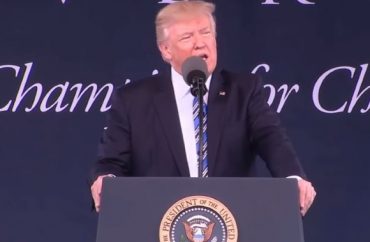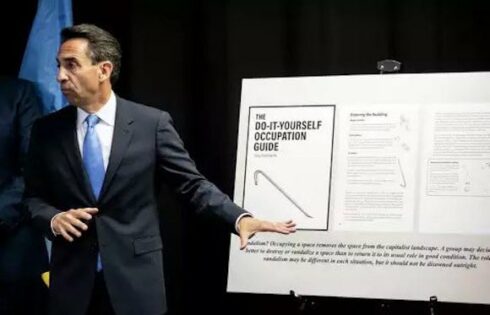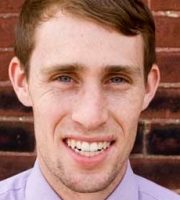
President Donald Trump will be the main subject of a new course offered to students this fall at Syracuse University. But while other courses at multiple universities have sought to scrutinize his policies or even appeared anti-Trump, this new course plans to concentrate on the president’s long-standing presence in popular culture over the years.
The 300-level “Rhetoric and Popular Culture” class at Syracuse will examine how Trump is framed by popular culture and how his administration engages with it, Communication and Rhetorical Studies Prof. Kendall Phillips told The College Fix in an email.
Phillips has taught the “Rhetoric and Popular Culture” course in the past, using different topics that have previously included Batman, war and drinking. This year’s focus comes from Phillips’ interest about Trump’s unique background as a non-politician.
“So, most of us knew him primarily as a celebrity. This celebrity was based in part on his prominence in real estate and other endeavors, but also because of his media presence. So, it seemed like a good time to focus on pop culture and the presidency,” he said.
Phillips said he intends to make it “absolutely clear from day one” that the course is not dedicated to examining Trump and his administration’s political policies.
“What we are focusing on is how a given policy is framed by the media and not just news but in places like the social media, sitcoms, [Saturday Night Live], etc.,” he said.
While Trump is the inspiration for the course, which will have about 75 students enrolled, Phillips emphasized he’s simply one aspect of the course’s broader exploration. It will also look at how previous presidents have interacted within the world of media and popular culture.
Students will start by taking a broad look into popular culture, examining its various aspects and the industries responsible for creating it. Phillips said the class will then study specific issues, including the concept of celebrity, political campaigns, political parodies and different mediums of popular culture, and how they intersect with the presidency and Trump in particular.
The class will also delve into how popular culture can be a place of controversy and resistance toward a president. Such examples, Phillips said, include rocker Ted Nugent’s controversial comments about President Barack Obama and actress Rosie O’Donnell’s long-running feud with Trump, who has called her a “pig.”
We finally agree on something Rosie. https://t.co/BSP5F3PgbZ
— Donald J. Trump (@realDonaldTrump) May 11, 2017
The main text for Phillips’ class will be Celebrity in Chief: A History of the Presidents and the Culture of Stardom. Weekly writing assignments will ask students to tie in class concepts with contemporary popular culture.
“I’m asking students to write assignments as ‘reports’ on cultural trends,” Phillips said. “This is something that happens in the media industry – lots of agencies offer reports on cultural trends to companies that want to be prepared for new ideas/opportunities.”
With fall classes not slated to begin until August 28, Phillips said he’s still tinkering with his final course syllabus.
Phillips said there’s a notion in society that politics and popular culture are separate entities, but that today the two are intertwined. He hopes his course helps students understand that connection.
“So, where my generation watched CBS Evening News, now they are more likely to watch The Daily Show or listening to talk radio,” he said. “So, I want students to recognize the many ways that popular culture is involved in our politics and to be conscious of the ways this involvement influences our view of the world.”
MORE: University whitewashes anti-Trump course description, but content remains the same
Like The College Fix on Facebook / Follow us on Twitter






Please join the conversation about our stories on Facebook, Twitter, Instagram, Reddit, MeWe, Rumble, Gab, Minds and Gettr.